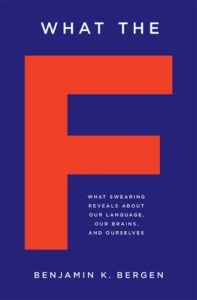Book Review: What the F
 Disclosure: I received a free advance review copy of this book from the publisher, Basic Books.
Disclosure: I received a free advance review copy of this book from the publisher, Basic Books.
I was a little nervous when I was asked to review Benjamin K. Bergen's new book, What the F: What Swearing Reveals About Our Language, Our Brains, and Ourselves. Unlike many of my linguist and editor friends, I'm not much of a swearer. I was raised in a fairly conservative religious household, and I can count the number of times I swore as a child on one hand with some fingers left over. Even now I swear pretty rarely. When someone asked me if I'd like to contribute to the group blog Strong Language (tagline: a sweary blog about swearing), I politely declined simply because I wouldn't have much to add.
But even for someone with as clean a mouth as me, What the F is a fascinating read. Bergen starts by looking at the different realms swear words come from, like religion, sex, bodily effluvia, and disparaged groups. Most swear words across cultures probably fall into one of these categories, but different categories are weighted differently across cultures. For example, in French-speaking Quebec, some of the most offensive words are religious terms, even though most Quebecois nowadays are not very religious. Japanese, on the other hand, is said to lack dedicated swear words, but it still has ways to express the same ideas.
Bergen then dives into what makes a swear word a swear word, exploring concepts like sound symbolism to see whether there's something innately sweary about certain words. In English, at least, there are some strong tendencies-our swear words tend to be monosyllabic and end with a consonant, especially consonants lower on the sonority hierarchy, like stops, affricates, and fricatives. That is, a word ending in k sounds swearier than a word ending in m. But this doesn't necessarily hold across other languages, and it doesn't offer a complete explanation for why English swear words are what they are. There are certainly other words that fit the pattern but aren't swears. To a large extent it's simply arbitrary.
Similarly, gestures like flipping the bird are largely arbitrary too, despite what appears to be some striking iconicity. But rude gestures vary widely, so that a gesture that seems harmless to Americans, like a thumbs-up or an A-OK, can be just as offensive as the bird in other countries. Even swearing in sign language isn't as symbolic or iconic as you might think; signs for the f-word are quite different in American and British Sign Language, though the connection between signifier and signified is perhaps a little less arbitrary than in spoken language. Swear words are swear words because convention says they are. If you hear people use a certain word a certain way, you figure out pretty quickly what it means.
Some of the most fascinating parts of the book, though, come from what swearing tells us about how the brain works. Most students of linguistics probably know that some stroke victims can still swear fluently even if their other language abilities are severely impaired, which tells us that swearing uses different mental circuitry from regular language-swearing taps into much more primal neural hardware in the basal ganglia. On the flip side, Tourette's syndrome, which involves dysfunction of the basal ganglia, can cause an overwhelming urge to swear. Some deaf people with Tourette's feel the same urge, but the swearing comes out via their hands rather than their mouths. And the fact that the brain reacts to prevent us from accidentally saying swear words shows that we have a built-in censor monitoring our speech as it's produced.
In a later chapter, Bergen debunks a paper by a team from where else but the School of Family Life at my alma mater, Brigham Young University, that purported to show that exposure to swearing actually harms children. Although there's evidence that slurs can harm children, and verbal abuse in general can be harmful, there's actually no evidence that exposure to swearing causes children harm. And Bergen ends with a thoughtful chapter titled "The Paradox of Profanity", which argues that profanity gets much of their power from our attempts to suppress it. The less frequently we hear a swear word, the more shocking it is when we do hear it.
Throughout the book, Bergen maintains a nice balance between academic and approachable. The book is backed up by copious notes, but the writing is engaging and often funny, as when a footnote on the "various other manifestations" of the chicken gesture ("bent elbows moving up and down to depict chicken wings") led to this Arrested Development clip.
Come for the swears; stay for a fascinating exploration of language and humanity.
What the F: What Swearing Reveals About Our Language, Our Brains, and Ourselves is available now at Amazon and other booksellers.